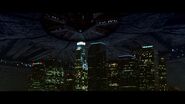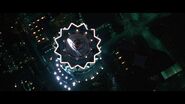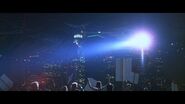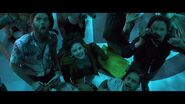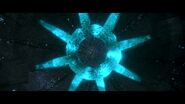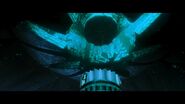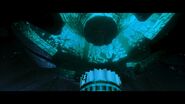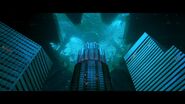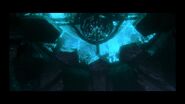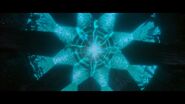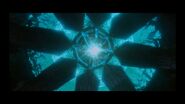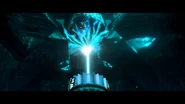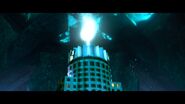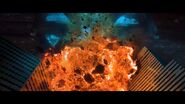The U.S. Bank Tower formerly known as the First Interstate Bank World Center, was a skyscraper in Los Angeles that was destroyed in the War of 1996.
History[]
The First Interstate Bank was the primary landmark targeted for destruction by a City Destroyer during the War of 1996. Prior to its destruction, due to the City Destroyer hovering directly over the Interstate Bank, a crowd of alien enthusiasts and eccentrics, which included an exotic dancer named Tiffany, believed the invaders harbored benevolent intentions, gathered on the very roof of the building to greet the aliens. L.A. authorities later urged the people to evacuate the building, but they refused to heed their warning. As a result, they were killed when the destroyer fired its weapon. The Interstate Bank was obliterated along with the rest of Los Angeles.
Gallery[]
City Destroyer deploying its weapon[]
Destruction[]
Behind the scenes[]
- At the time of the filming and release of Independence Day, the First Interstate Bank was originally called the Library Tower, which was later restored after First Interstate Bancorp merged with Wells Fargo Bank, before it was renamed the U.S. Bank Tower in 2003.
- The top third of the building was replicated as an eighteen-foot tall, seven-foot wide miniature and was detonated with a series of successive, overlapping explosions by pyrotechnician Joseph Viskocil and his crew.
- The First Interstate along with the Citigroup Center and Mellon Bank Building are positioned incorrectly during the filming of the building's annihilation.
- In The Art and Making of Independence Day: Resurgence, Karl Walter Lindenlaub recalled the shooting of the Bank Tower scene as one of the most logistically complicated sequence of the entire shoot:
- "We shot that in one evening with two helicopters in the air and seven camera crews on different rooftops, but each rooftop had lighting rigs that we specifically put there so that we would film from the air and could actually see those people on the roofs. We had come up with different ways to design lighting for these rooftops, they had to be made safe, and they were rigged for two weeks. On the day, we had a sort of command station at the tallest building which, in those days, was the First Interstate Bank. On the rooftop we had a crew shooting actors and extras, and on the floors below we had some other cameras and some windows taken out, and then Roland had a console with video transmissions from each camera on these rooftops. There had to be a video link via satellite link so we could see what all the other camera crews were doing. We had a camera on a helicopter that was like a police helicopter that was in the shot. All this had to be practised and co-ordinated and practised again, and then we had a window of twenty-five minutes where the sky still had a little bit of blue, but the city lights and street lights were on. We call that "magic hour," and in that period we had to shoot that sequence. It was really exciting."
- ―Karl Walter Lindenlaub


